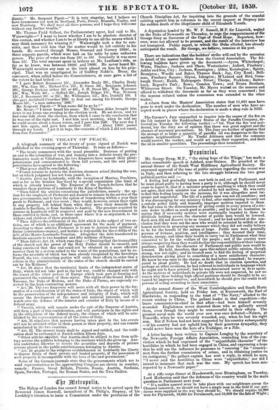THE TREATY OF PEACE.
A telegraph summary of the treaty of peace signed at Zurich was published in the evening papers of Thursday. It runs as follows-
" The treaty commences with the usual preamble. Desirous of putting an end to the calamities of war, and forming into a definite treaty the pre- liminaries made at Villafrauca, the two Emperors have named their pleni- potentiaries and communicated to them full powers, and the said pleni- potentiaries have agreed to the following :
" That peace shall be concluded, &c. "France returns to Austria the Austrian steamers seized ;during the war, but on which judgment has not been passed, &c. " Austria gives up Lombardy, with the exception of Mantua, Peschiera, and as far as the frontier line fixed by a special commission (the limit of which is already known). The Emperor of the French declares that he transfers these portions of Lombardy to the King of Sardinia.
"Then follow the articles concerning the jurisdiction, namely : the op- tion for the employes of Piedmont and Austria to remain in the service of the two governments, and to have the option of transferring within a year their goods to Piedmont, and vice versa ; they would, however, retain their right to any property left behind them when they move their domicile from Austria to Sardinia, or from Sardinia to Austria. The pensions acquired by persons in Lombardy will be respected and paid by the new Government to those entitled to them, and, in those cases where it is so stipulated, to the widows and children of those pensioned.
"Then follows the settlement of the debt which is the subject of two ar- ticles, one of which is an additional agreement for the mode of payment. According to these articles Piedmont is to pay to Austria forty millions of florins (conventions-munse), and besides is responsible for three-fifths of the debt of the Monte-Lombardo-Venetian. Altogether the debt transferred to Sardinia amounts to two hundred and fifty millions of francs. " Then follows Art.18, which runs thus Desiring that the tranquillity of the church and the power of the Holy Father should be ensured, and being convinced that this end could not be obtained in a more effective manner than by a system suited to the wants of the populations, and by re- forms the necessity of which has been already recognized by Sovereign
Pontiff, Soveign
Pontiff, the two contracting parties will unite their efforts in order that a reform in the administration of the states of the church should be carried out by his Holiness.'
" Art. 19 states that the territorial limits of the independent states of Italy, which did not take part in the last war, could be changed only with the assent of the other powers of Europe which took part in forming and guaranteed the existence of these states. The rights of the Grand Duke of Tuscany, the Duke of Modena, and the Duke of Parma, are expressly re- served by the high contracting powers. " Art. 20. The two Emperors will assist with all their power in the for- mation of a confederation of all the states of Italy, the object of which will be the preservation of the independence and integrity of Italy, which will insure the development of the moral and material interests, and will watch over the defence of the interior and exterior of Italy by means of a federal army. " Venetia, which will remain under the rule of the Emperor of Austria, will form a part of this confederation, and will participate in the rights and in the obligations of the federal treaty, the clauses of which will be esta- blished by the representatives of all the states of Italy. " Art. 21 stipulates that persons having taken part in the late events will not be attacked either in their person or their property, and can remain unmolested in the two countries.
" Art. 22. The present treaty shall be signed and ratified, and the ratifi- cation shall be exchanged at Zurich within fifteen days. "Other articles stipulate that Austria shall be obliged to free from mili- tary service the soldiers belonging to the territory which she gives up. Aus- tria undertakes likewise to restore the securities and deposits of private persons placed in the public establishments belonging to Austria.
"Art. 16 grants to the religious establishments in Lombardy the liberty to dispose freely. of their private and landed property, if the possession of such property is incompatible with the laws of the new government."
Some of the German journals state that the governments which are to send representatives to the approaching Congress are eleven in number, namely : France, Great Britain, Prussia, Russia, Austria, Sardinia, Spain, Sweden, Portugal, the Roman States, and the Two Sicilies.


























 Previous page
Previous page